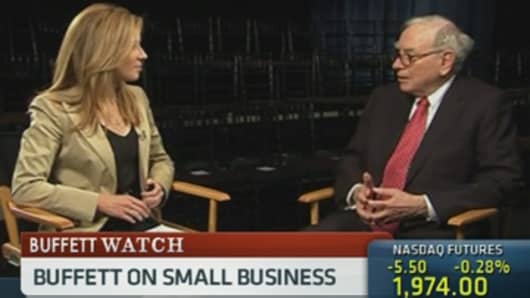Here's the entire clip as it aired this morning on the 7a ET hour of Squawk. Becky started by asking Buffett if he thinks the Federal Reserve should do more 'quantitative easing' if the economy doesn't improve:
BUFFETT: We've got three tools really in fighting a recession. And the ones you read about are monetary policy, which is the Fed. And, of course, fiscal policy. I think the most important factor in getting out of the recession actually is just the regenerative capacity of American capitalism. And we had many recessions in the history of this country when nobody even heard of fiscal policy or monetary policy. The country always comes back.
There are 309 million people out there that are trying to improve their lot in life. And we've got a system that allows them to do it. It doesn't allow things to get changed overnight, though. And, and, it's, it's important to have the right monetary policy. It's important for, to have the right fiscal policy. But it's nowhere near as important as just the normal regenerative capacity of American capitalism.
BECKY QUICK: It sounds like you're asking for patience. That that's what it takes to get through this.
WARREN BUFFETT: Well, unfortunately, I just, I don't know how to do it. I mean, if, if it was a question of, you know, I think the Fed is paying those banks a quarter of a percent now. I thought maybe, maybe they ought to charge them a quarter of a percent to leave their money on deposit and that would really push it out. (Laughter.) But, but I mean, we've used up a lot of bullets. And we talk about stimulus. But the truth is, we're running a federal deficit that's nine percent of GDP. That is stimulative as all get out. I mean, that is more stimulative than any policy we've followed since World War II.
And, of course, World War II, we had a huge stimulus and it, it took us out of, a depression. But we are, it doesn't depend on calling it the 'Stimulus Bill' to be stimulating. I mean, if the government is spending $3 for every $2 it takes in, that is, that is fiscal stimulus. And it isn't kick-starting things as much as the American public would like. I'm sure as much as the Administration or Congress would like. It's probably had some effect, probably less than the economists thought it would have going into this.
What will take us out of this is people like these 23 people that, that we gave a diploma to today. And big business. I mean, everybody glorifies small business. God bless 'em, you know? And, and I'm not supposed to talk about mother on Father's Day. But, but I would say that, remember, the jobs that medium-sized businesses, large businesses, giant businesses, they're all important.
BECKY: For all of those businesses to be hiring, has Washington done enough at this point? Would you like to see more done? It sounds like from a stimulus perspective, you've seen enough. Maybe from the Fed's perspective, you've seen enough. Is there anything you'd like to see different in tax structure?
BUFFETT: Well, I think for one reason or another, and everybody has their own explanation, sentiment has turned very sour in the last three or four or five months. It's been generally sour on Congress and Washington, but it seems to have taken a turn for the worse. I hope we get over it pretty soon, because it's, it's not productive. We will come back regardless of how people feel about Washington. But, it's not helpful to have people as unhappy as they are about what's, what's going on in Washington. And, I'm not sure exactly what's gonna get us out of that, but we'll get out of it.
Current Berkshire stock prices:
Class B:
Class A:
For more Buffett Watch updates follow alexcrippen on Twitter.



